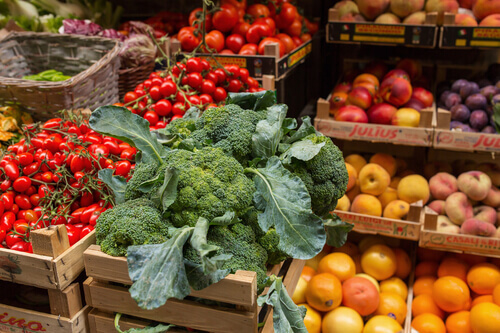Updated May 2023
Shopping at local farmers markets can offer a healthy nutrition boost to your diet while also supporting your local community. Plus, they are fun!
There are few joys in summer greater than snacking on just-picked berries or biting into a farm-fresh juicy tomato or ear of corn. And the perfect way to enjoy all that the season has to offer in nutritional goodness is to make it a habit to visit your local Farmers Markets during the growing season. Eating a healthy diet with plenty of vegetables and fruits can help you lower your risk for heart disease and some types of cancer, maintain or reach a healthy weight and keep your body strong and active. But there are many other benefits too. Here are seven reasons why you should shop local Farmers Markets during growing season:
1. The fruits and vegetables are very fresh! You can’t get any fresher than farm to table produce. Most of the fruits and vegetables sold at Farmers Markets were picked that day, or within a day or two. Contrast that with supermarket fruits and veggies that are shipped cross country, or shipped from other countries. It’s estimated that the average American meal travels 1500 miles to get from farm to table. (source)
2. The produce is at peak flavor and nutrition. The fresher the produce, the better the taste. Plus, just-picked produce contains maximum nutrients and vitamins. To transport fruit and vegetables over long distances, they are often picked unripe and then gassed to “ripen” it after transport. (source)
3. It’s a good way to up your fruit and veggie intake. Nutritionists suggest that a healthy diet should include five portions of fruit and vegetables a day, but this is a case where more is better. According to the Centers for Disease Control, “Eating fruits and vegetables adds nutrients to diets, reduces the risk for heart disease, stroke, and some cancers, and helps manage body weight when consumed in place of more energy-dense foods.”
4. You have access to expert produce advice. Growers are experts in the fruits and vegetables that they grow. Most are glad to share expert tips on storage and preparation of their fare. You might even get a few expert tips for planting your next season’s garden!
5. Pricing is comparable and often lower to the chain stores. There’s a frequent assumption that produce from farmers markets is more expensive than from a big grocery store shopping but studies show this is generally a myth. (source) Seasonality and location may affect pricing – smaller Farmers Markets tend to be cheaper than big ones. And even when produce does cost a little more, see #1 and #2.
6. Supporting your local community. Growers are small local businesses and job creators, so supporting local farms offers tax and job benefits to your local community. Plus, American farmers get 15.6 cents per dollar spent in the grocery, but farmers markets allow the grower to earn more of the food dollar – most of which they reinvest locally. (Source)
7. It’s a green thing to do. Supporting local farms keeps them viable and preserves natural green space in your community. Buying more food locally also takes much less of an environmental toll: food that is transported over long distances requires fuel consumption and related environmental costs.
Here are two sources to find Farmers Markets near you: Local Harvest Farmers Markets and the National Farmers Market Directory.
Here are some tips for making the most of your local Farmers Market shopping day:
- Know what’s in season.
- Comparison shop. Browse through all tables and stalls before buying to compare variety, quality and price.
- Bring cash in small bills and your own tote bags.
- Go early in the day for the widest and freshest selection.
- Go late in the day for bargains.
- Talk to the buyers – tap into their expertise.
- Bring your kids. It’s fun and exposing kids to fresh foods at a young age can start a lifelong healthy habit.
- If you’d like to combine healthy, local produce with a bit of exercise, why not visit a local Pick Your Own Farm?
Bonus tip: If you are a Member of ESI Total Care Wellness, you can call a certified nutrition coach for one-to-one nutrition planning to incorporate more fruit and vegetables in your diet!

